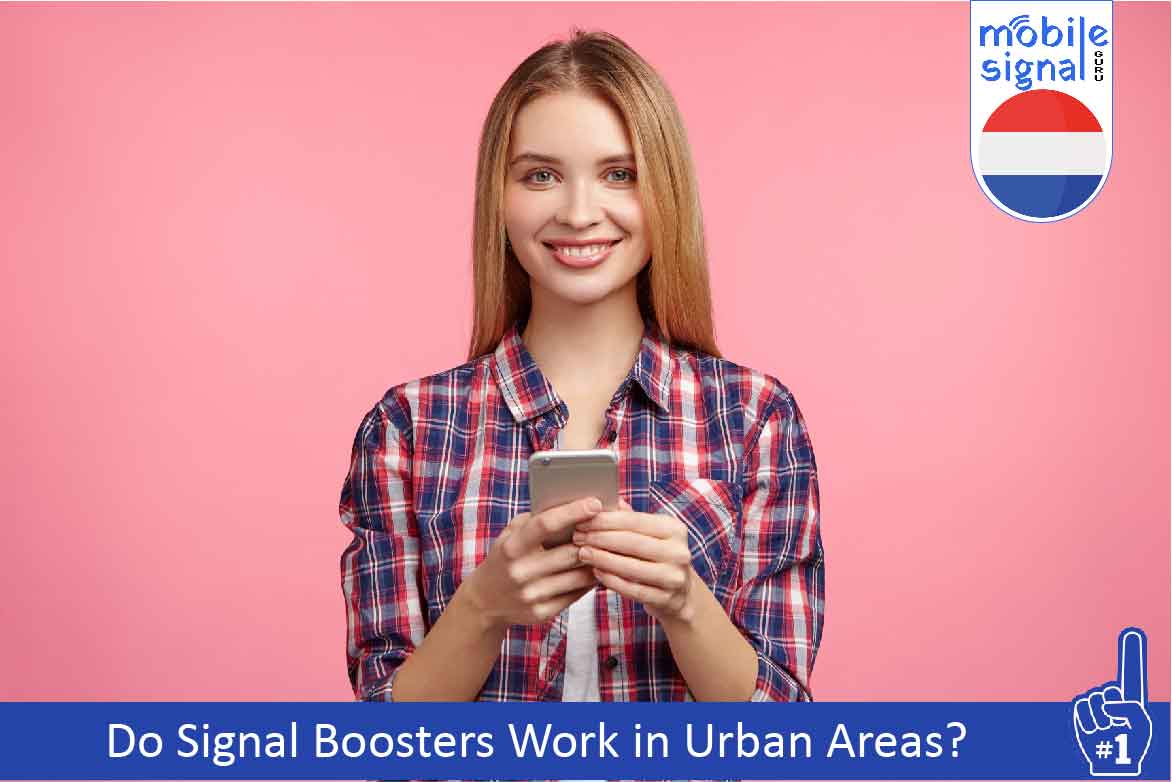In today’s world, mobile phones are not just for communication; they are essential for accessing the internet, using apps, and connecting with people globally. However, there are many places where mobile signals can be weak, especially in urban areas. If you are living in the Netherlands or working in a bustling city like Amsterdam, Rotterdam, or The Hague, you might have noticed poor call quality or slow internet speeds. This is where signal boosters come into play. But do signal boosters actually work in urban areas, and can they solve the problem of weak signals? In this article, we’ll explore everything you need to know about mobile signal boosters, their effectiveness in urban environments, and whether they can improve your mobile call quality and data speed.
What is a Mobile Signal Booster?
A mobile signal booster is a device that helps improve weak mobile signals. It does this by amplifying weak signals from cell towers and redistributing them to areas with poor reception. Signal boosters typically consist of three main parts:
- External Antenna: Captures the weak signal from nearby mobile towers.
- Amplifier: Boosts the captured signal.
- Internal Antenna: Redistributes the enhanced signal to the targeted area.
In urban areas, mobile signal boosters can be especially helpful since high-rise buildings, crowded spaces, and other factors often interfere with strong signal reception.
Why Urban Areas Face Signal Problems
Urban areas in the Netherlands are densely populated and have a lot of buildings and infrastructure. As a result, there are several factors that can affect your mobile signal quality:
- Tall Buildings: High-rise buildings can block signals from reaching certain areas, causing weaker reception inside buildings.
- Network Congestion: In cities with a large population, many people are using mobile networks at the same time, which can slow down speeds.
- Interference: Urban areas often have various electronic devices that can interfere with mobile signals, such as Wi-Fi routers, radios, and other devices.
These challenges can result in dropped calls, slow data speeds, or a complete lack of signal in certain areas. This is where signal boosters can step in to help.
How Do Signal Boosters Work in Urban Areas?
Signal boosters are designed to work well in both rural and urban areas. In cities, they capture weak signals from nearby mobile towers, amplify them, and provide a stronger, more stable signal inside buildings or other areas where reception is poor.
In urban environments, signal boosters use an external antenna to pick up the signals from nearby cell towers. They then boost these signals, allowing the internal antenna to broadcast the stronger signal to your devices. This means that the signal quality inside buildings, offices, and even homes can improve significantly.
Benefits of Using a Signal Booster in Urban Areas
There are many advantages to using a signal booster in urban areas, particularly in the Netherlands. Here’s a breakdown of the main benefits:
- Improved Call Quality: One of the main reasons people use signal boosters is to improve call quality. In urban areas, you might experience dropped calls or distorted voice quality. A signal booster ensures that your calls are clear and stable.
- Faster Data Speeds: In cities, network congestion can slow down your mobile data speeds. A signal booster helps by ensuring that you receive a stronger and more stable connection, resulting in faster download and upload speeds.
- Better Signal Coverage: If you live or work in a building with poor reception due to thick walls or being far from a cell tower, a signal booster can provide better coverage, allowing you to use your phone without issues.
- Increased Productivity: Whether you’re working from home or in an office, poor signal quality can hinder your work. With a signal booster, you can ensure that your mobile phone is always connected, which leads to better productivity.
-
Cost-Effective Solution: Instead of switching mobile networks or moving to another location with better signal coverage, a signal booster can be a more affordable solution for improving your mobile connection.
Types of Signal Boosters for Urban Areas
There are different types of signal boosters available in the market. Each type has its unique features that make them more suitable for certain environments. Here are the most common types of signal boosters:
- Single-Band Boosters: These boosters amplify signals for a specific frequency band, such as 2G or 4G. They are ideal for areas with limited network coverage or where only one mobile network is available.
- Multi-Band Boosters: These boosters amplify signals for multiple frequency bands, making them more versatile. They can work with 4G, and even 5G signals, making them suitable for a wide range of mobile networks.
- Mobile Signal Boosters: These are portable signal boosters that are ideal for vehicles or outdoor use. They can improve signal quality when you are traveling through urban areas where signal strength may fluctuate.
-
Home and Office Signal Boosters: These are designed for use in homes or offices. They are more powerful and capable of covering larger areas. Depending on the size of the building, you can select a booster that can cover your entire space effectively.
Do Signal Boosters Really Work in Urban Areas?
Yes, signal boosters do work in urban areas, but their effectiveness can vary based on several factors:
- Proximity to Cell Towers: Signal boosters work by amplifying the signal from nearby cell towers. In urban areas, there are usually multiple towers nearby, so the signal booster can capture and amplify those signals effectively. However, if you are far away from a tower, the booster may have less impact.
- Building Materials: Urban buildings are often constructed with concrete, steel, and glass, which can block signals. If you live in a modern high-rise, the signal might be weak inside your home, but a booster can still improve the signal by amplifying the weak external signal.
- Network Congestion: Urban areas with a large number of users can experience network congestion, especially during peak hours. A signal booster cannot increase the overall capacity of the network, but it can provide you with a stronger connection within your immediate environment.
-
Quality of the Booster: Not all signal boosters are the same. Some may be more effective than others depending on their quality, power, and coverage area. It is essential to choose a high-quality signal booster that meets your specific needs.
Choosing the Right Signal Booster for Urban Areas in the Netherlands
When selecting a signal booster for your urban home or office in the Netherlands, it’s essential to consider the following factors:
- Coverage Area: Consider the size of the area where you need better signal strength. A small home may need a smaller booster, while a large office building may require a more powerful unit.
- Mobile Network Compatibility: Check if the signal booster is compatible with the mobile network providers in the Netherlands, such as KPN, Vodafone, and Odido.
- Ease of Installation: Look for a signal booster that is easy to install and does not require professional help. Some boosters come with detailed instructions for DIY installation.
- Price: While signal boosters are an investment, it’s essential to find one that fits your budget. Make sure you compare prices and features to get the best value.
- Customer Support: Opt for brands that offer reliable customer support in case you need assistance with setup or troubleshooting.
Are Signal Boosters Legal in the Netherlands?
Yes, signal boosters are legal in the Netherlands, but there are some regulations you should be aware of. The Dutch regulatory authority, Agentschap Telecom, sets rules regarding the use of signal boosters. In general, using a signal booster that complies with local regulations and does not interfere with the mobile network is permitted.
Before purchasing and installing a signal booster, ensure that it complies with the regulations and does not cause interference with nearby mobile networks. We sell boosters that are certified for use in the Netherlands, making it easier to ensure compliance.
Conclusion
Signal boosters are highly effective in improving mobile call quality and data speed in urban areas of the Netherlands. Whether you live in a high-rise building in Amsterdam or work in a crowded office in Rotterdam, a signal booster can significantly enhance your mobile signal. By amplifying weak signals and providing more reliable coverage, these devices offer a cost-effective solution to the problems caused by network congestion, interference, and poor reception.
When choosing a mobile signal booster, consider factors like coverage area, mobile network compatibility, and ease of installation. Ensure that you purchase a certified booster that complies with local regulations for the best results.
In summary, yes, signal boosters can work wonders in urban areas, improving both call quality and data speeds, making them a smart investment for anyone experiencing weak mobile signals.
 Australia (AUD)
Australia (AUD) Denmark (DKK)
Denmark (DKK) France (EUR)
France (EUR) Germany (EUR)
Germany (EUR) Ireland (EUR)
Ireland (EUR) Malta (EUR)
Malta (EUR) New Zealand (NZD)
New Zealand (NZD) Norway (NOK)
Norway (NOK) Spain (EUR)
Spain (EUR) Sweden (SEK)
Sweden (SEK) UAE (AED)
UAE (AED) United Kingdom (GBP)
United Kingdom (GBP) Global Site (USD)
Global Site (USD)
